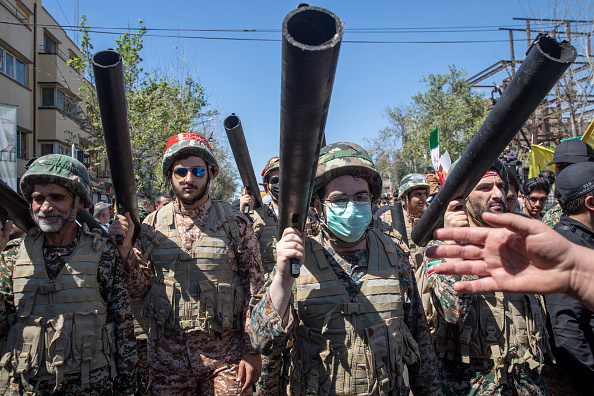The simmering shadow war between Iran and Israel – often conducted via proxies and in third countries – spilled into the open on Saturday.
Iran launched an unprecedented flurry of more than 300 drones and missiles towards Israeli territory over the weekend. It was the first time Tehran had struck its arch-enemy directly.
Tehran said it was retaliation for Israel’s attack on its consular building in Syria earlier in the month. Israel reportedly killed seven officers from Iran’s Revolutionary Guard (IRGC), including two senior commanders in Damascus.
Israeli officials are now threatening to respond against Iran despite calls for restraint from allies like the US and UK.
Western officials believe it may stop short of striking Iranian nuclear sites but could target Iran’s officers and equipment instead.
IRGC has warned of hitting Israel’s nuclear facilities and potentially pursuing an atomic weapon if Israel attacks its nuclear facilities.
Over the weekend, Iran warned of a much larger assault if Israel retaliates.
“Our response will be much larger than tonight’s military action if Israel retaliates against Iran,” the chief of staff of Iran’s armed forces, Major General Mohammad Bagheri, told state television following the strikes on Saturday.
The Iranian foreign minister, Hossein Amirabdollahian, said Tehran had informed Washington that its attacks would be “limited” and were self-defence.
Israeli officials said their missile defence systems had intercepted 99% of the Iranian projectiles, though some ballistic missiles hit the Nevatim airbase in southern Israel.
US, UK and Jordanian fighter jets were reportedly scrambled to help intercept drones and missiles en route between Iran and Israel.
“We intercepted, we repelled, together we shall win,” the Israeli prime minister, Benjamin Netanyahu, posted on X.
Simmering shadow war erupts into the open
On Saturday, sirens wailed across Israeli cities as hundreds of drones and cruise and ballistic missiles, in an operation dubbed ” True Promise” by the Iranian military, reached Israeli territory.
Footage showed air defence interceptions and explosions lighting up the skies above Tel Aviv and Jerusalem as the bombardment continued for several hours.
Analysts argue that the long-standing tacit codes governing the shadow war were breached by Israel when it bombed Iran’s consular premises in Damascus – an act viewed by Tehran as akin to an attack on Iranian soil itself.
Many speculate that Netanyahu may have approved that attack to deliberately provoke a broader regional crisis and get more support from its Western allies.
“Israel went too far in assassinating the Iranian general, probably, in a diplomatic location,” said Yagil Levy, a military sociology professor at the Open University of Israel, according to the Guardian.
In a statement on Sunday, Iran’s foreign ministry said the attacks were conducted under the UN charter’s right of self-defence following the consulate attack.
It said: “The Islamic Republic of Iran’s resort to defensive measures in exercise of its right of self-defence demonstrates Iran’s responsible approach toward regional and international peace and security at a time when the occupying apartheid regime’s pattern of relentless genocidal campaign against Palestinian people is accompanied with repeated military aggressions against neighbouring States and fanning the flames across the region and beyond.”
The US president, Joe Biden, called Iran’s attack “brazen,” while Britain’s Rishi Sunak said the strikes were “reckless.” The EU foreign policy chief, Josep Borrell, called it “an unprecedented escalation and grave threat to regional security.”
Meanwhile, a former financial adviser to Israel’s military estimated the cost of activating Israel’s defence systems at between $1bn and $1.3bn for the single night’s bombardment.
“The defence tonight was on the order of 4-5bn shekels [$1-1.3bn] per night,” Brig Gen Reem Aminoach told Ynet news.









